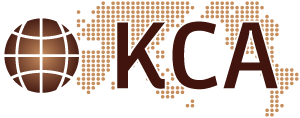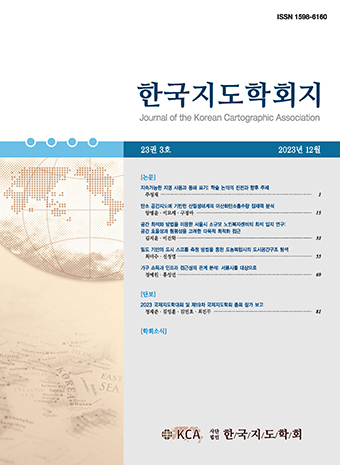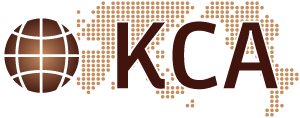Research Article
Abstract
References
Information
The government officials of developing countries such as Cambodia that has not made its own map have been dispatched to Korea every year to learn advanced geospatial information of the Republic of Korea. This fact means that the international demands in geospatial information education have been increasing. The purpose of this study was to propose the improvement plan of educational policy to more systematically share experience and transmit technologies of Korean geospatial information for developing countries. It derived implications through analyzing the current status of geospatial education in Korea and overseas for developing countries. In addition, the survey of satisfaction level for the trainees who had finished the training course of the NGII (National Geographic Information) in cooperation with KOICA (KOrea International Cooperation Agency) was performed to elicit major issues in geospatial education for developing countries. Based on this analysis, this study suggested three strategies such as improvements of the education curriculum, the construction of education infrastructure facilities and the development of education service platform. It was judged that the results of the study could be contributed in not only enhancing the status of Korea as donor country of OECD members but also supporting expansion of overseas markets of Korean geospatial information industry.
자국의 지도가 없는 캄보디아와 같은 개발도상국의 공무원들이 한국의 선진 공간정보를 배우기 위해 매년 우리나라에 파견되고 있다. 이는 공간정보의 국제적인 교육 수요가 증가하고 있음을 의미한다. 이 연구의 목적은 개발도상국을 대상으로 우리나라의 공간정보 경험을 공유하고 체계적인 기술 전파를 위해서 교육 정책의 개선 방안을 제시하는데 있다. 이를 위해 국내·외에서 수행 중인 개발도상국 대상의 공간정보 교육 체계에 대하여 분석하고 주요 시사점을 도출하였다. 그리고 한국국제협력단(KOICA)과 국토지리정보원에서 수행한 공간정보 교육 수료생을 대상으로 설문조사를 실시하여 우리나라 공간정보 교육서비스의 주요 이슈 사항을 도출하였다. 도출 내용을 토대로 교육 커리큘럼 개선, 교육 인프라 확충, 온라인 교육서비스 플랫폼 개발 등의 정책 개선 방안을 제시하였다. 그리고 이러한 개선책은 경제협력개발기구(OECD) 공여국으로서의 우리나라 위상을 높이면서, 국내 공간정보 산업의 해외 시장 진출에도 크게 기여할 수 있을 것이다.
- 강영옥・박지영, 2017, “공간정보기술 활용 교육에 대한 교사 요구사항 분석 및 교육서비스 제공 전략,”한국지도학회지, 17(1), 59-69.
- 국토지리정보원, 2017, 「2017년 유라시아 통합 공간정보인프라 구축 지원 연구」.
- 김걸, 2015, “신흥시장 진출을 위한 한국 공간정보의 글로벌화 전략 연구: 아시아 개발도상국의 사례를 중심으로,”한국공간정보학회지, 23(5), 21-30.
- 김걸・정진도・이재용, 2014, “공간정보 오픈플랫폼의 국가별 해외 수출 전략 연구: 캄보디아와 아부다비 에미리트를 중심으로,”한국공간정보학회지, 22(3), 9-21.
- 박경진・류춘렬・최진수・정현철, 2016, “IPA 기법을 활용한 과학영재교육 수혜자들의 교육프로그램에 대한 인식 분석,” 영재교육연구, 26(3), 427-447.
- 양숙희・성효현, 2007, “GIS 현장 요구분석을 기반으로 한 전문계 고등학교에서의 GIS 교육내용 개발,”한국지도학회지, 7(2), 33-51.
- 정진도・한선희・이재용, 2014, “공간정보 오픈플랫폼 수출을 위한 해외 국가 유형별 진출전략 수립에 관한 연구,”한국지도학회지, 14(2), 73-87.
- Miyahara, B., 2015, JICA Training Courses Conducted by GSI, Proceedings, 20th United Nations Regional Cartographic Conference for Asia and the Pacific: UN-GGIM-AP and ICA Joint Workshop for Capacity Building, October 6-9, Jeju Island, Republic of Korea, 5-15.
- Murai, S., 2008, JICA Net Distance Education on Remote Sensing and GIS for Developing Countries, Proceedings, XXIth The International Archives of the Photogrammetry, Remote Sensing and Spatial Information Sciences, July 3-11, Beijing, China, 37(B6a), 191-196.
- United Nations, 2016, Contribution of regional committees and thematic groups to the global geospatial information agenda (E/C.20/2016/3), Proceedings, Sixth Session of the United Nations Committee of Experts on Global Geospatial Information Management (UN-GGIM), Economic and Social Council, August 1-5, United States of America, New York, 1-53.
- SERVIR 홈페이지, https://servirglobal.net
- UNOSAT 홈페이지, https://unitar.org/unosat
- Publisher :The Korean Cartographic Association
- Publisher(Ko) :한국지도학회
- Journal Title :Journal of the Korean Cartographic Association
- Journal Title(Ko) :한국지도학회지
- Volume : 19
- No :2
- Pages :79~89
- DOI :https://doi.org/10.16879/jkca.2019.19.2.079



 Journal of the Korean Cartographic Association
Journal of the Korean Cartographic Association





